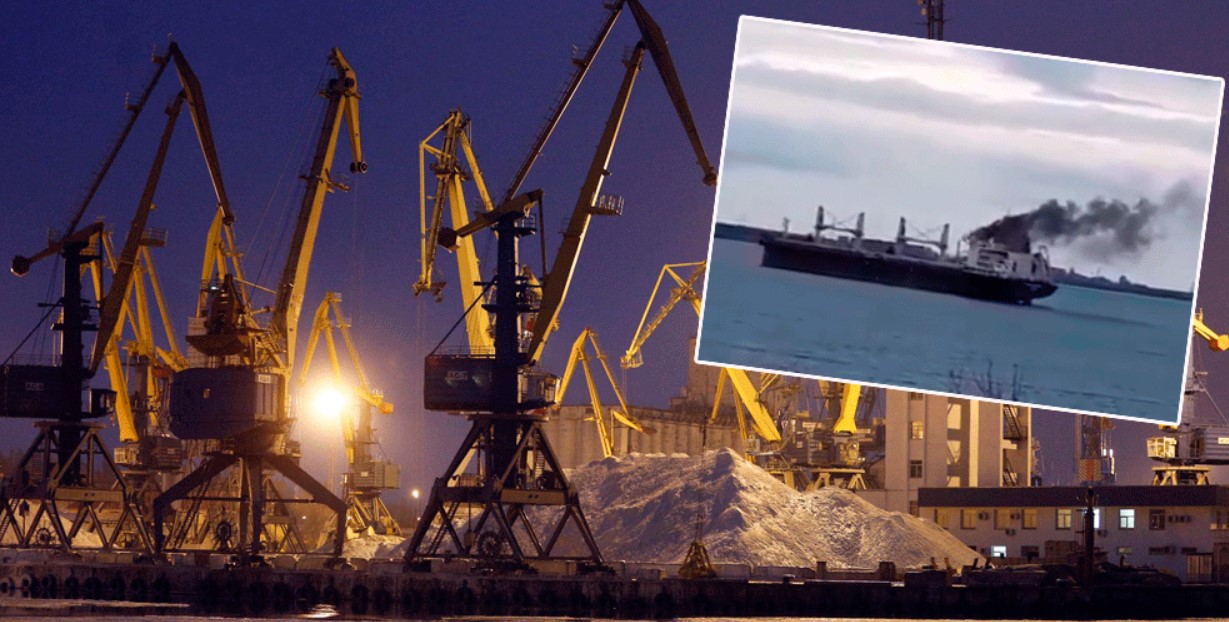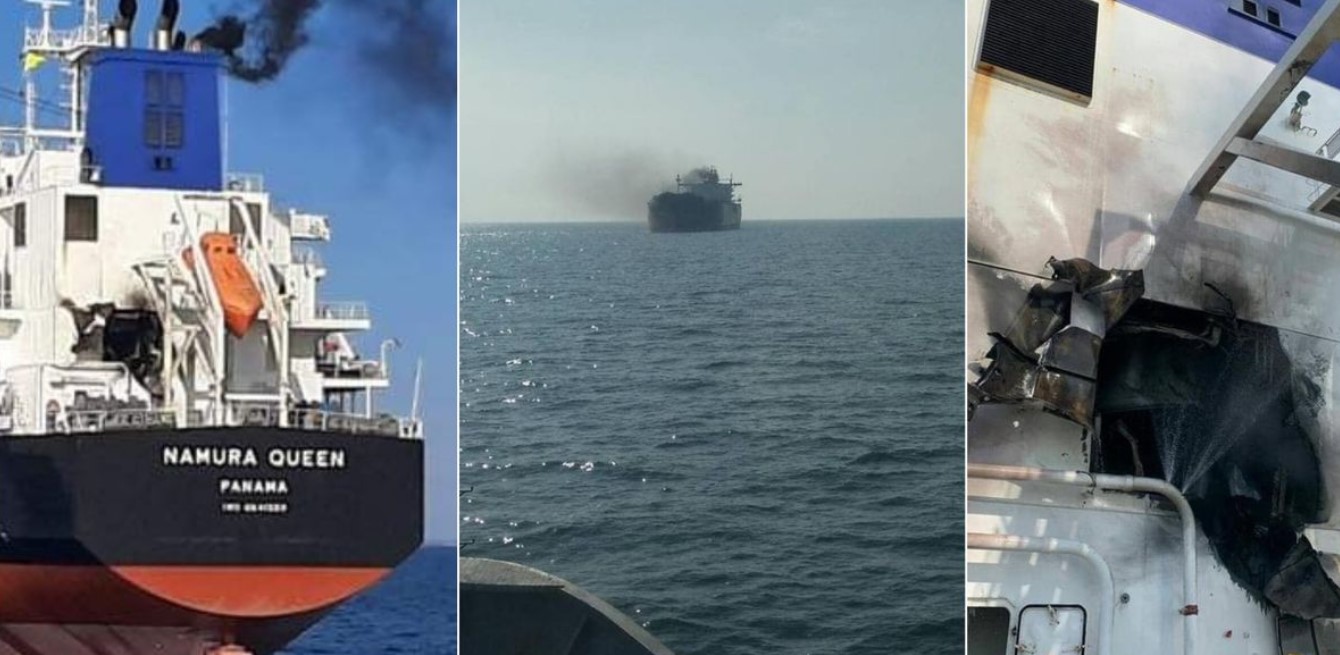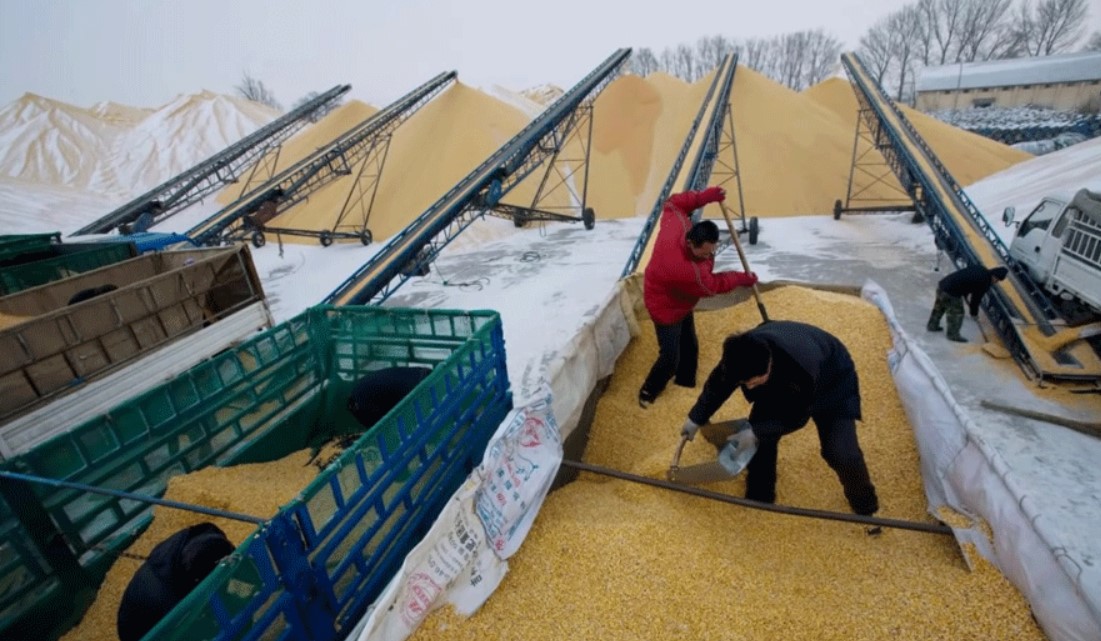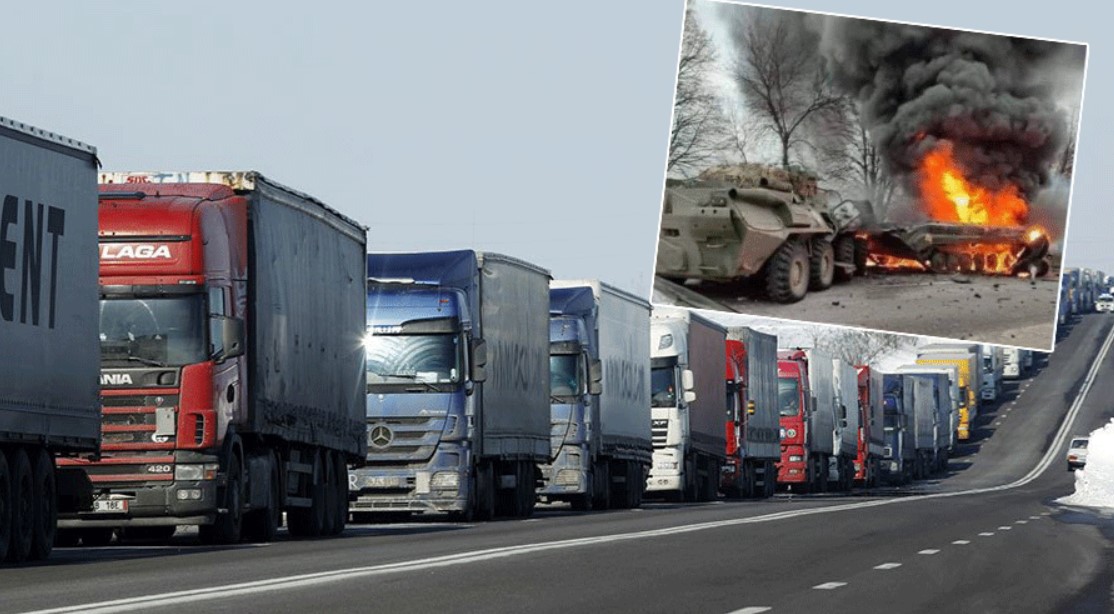 The Moldovan tanker Millennial Spirit, which carried 600 tonnes of diesel, was also shot down on 25 February. Two crew members were injured and all had to go in the lifeboats. Kiev and the Western media once again accused Moscow of the attack, without mentioning that the crew was predominantly Russian. Photo: Ukrainian Ministry of Defense
The Moldovan tanker Millennial Spirit, which carried 600 tonnes of diesel, was also shot down on 25 February. Two crew members were injured and all had to go in the lifeboats. Kiev and the Western media once again accused Moscow of the attack, without mentioning that the crew was predominantly Russian. Photo: Ukrainian Ministry of Defense
The global supply chain faces unprecedented hurdles
The conflict in Ukraine has created more disruptions in the already very strained supply chain, which is affecting the delivery and thus the prices of all goods. This applies not least to vital food and energy. After several merchant ships carrying food and energy were attacked in the Black Sea in recent days, multinational companies have decided to interrupt maritime traffic there.
Published: March 15, 2022, 8:50 am
Together with unprecedented sanctions against Russia, virtually all exports from Russia and Ukraine have been stopped. The now warring countries supply the world market with a third of the world’s wheat and many other important raw materials, so the impact will be considerable. In addition, China has been hoarding gigantic amounts of food since earlier this winter and currently has more grain stored than the rest of the world combined. Governments are therefore forced to halt exports to ensure the needs of their respective nations. “A perfect storm” has been created which may collapse the global logistics chain, with unpredictable consequences.
Although Ukraine and Russia account for a small share of total imports to major manufacturing nations such as Germany and the United States, as the system media usually point out, they are also very important suppliers of energy and raw materials for an array of products in the global supply chain. The now warring countries are also large exporters of grain and food, with significant world market shares. This will affect global food security and not least the countries that are major importers from them.
Six important areas – energy, food, fertilizers, logistics, raw materials and electronics – will face huge challenges that will hit Europe and the world hard.
Energy
Russia produces around 30 percent of the energy on the world market. Many European countries are heavily dependent on Russian gas, which makes sanctions against Russia a highly double-edged sword. This is one of the main reasons why the EU was initially reluctant to remove Russia from the international payment system SWIFT. Only a week after the operation in Ukraine, which began on the morning of February 24, did the EU decide to shut down seven Russian banks from SWIFT starting on March 12.
Germany has also indefinitely postponed the opening of the new Nord Stream 2 gas pipeline, which runs via the Baltic Sea. The United States has been working hard for many years to stop the project. In October last year, Nord Stream 2 was completed, pressure tested and ready for commissioning. Only a decision by Berlin to start using it remained, but shortly afterwards last autumn, the crisis in Ukraine suddenly intensified – with escalating outrage in the system media against Russia and its President Vladimir Putin. The decision that was expected in November has since been postponed until the war became a fact.
Europe gets about 40 percent of its natural gas from Russia. It is unlikely that Europe will completely want to stop Russian gas imports, as this would have a devastating effect on Europe’s energy security and electricity prices. But nothing is stopping Russia from doing so in response to the increasingly extensive sanctions that the West now imposes almost daily in every conceivable area. However, relatively small disruptions to energy supplies are enough to have a significant impact on Europe. An example is when Russian Gazprom on March 4 reduced the flow from 13.5 to 0.1 million kilowatt hours (kWh) per hour in the Yamal gas pipeline, which goes to Germany via Poland.
Energy prices have already risen so sharply that middle-sized companies have had to shut down. On March 4, the price of oil (WTI) had almost doubled in one year and had risen by more than 60 percent since the beginning of December. The spot price for natural gas rose in the UK by over 70 percent in just a few days after the outbreak of war. The British government then quickly decided to allow gas to be an exception in the harsh sanctions they have just imposed on Russia, which, among other things, prohibit Russian merchant ships from docking in British ports.
Food
Global food prices rose sharply as early as 2021. Food security will now be further eroded as Russia and Ukraine globally account for almost a third of all wheat exported, a fifth of all maize and 80 percent of sunflower oil. They are very important raw materials used in many food products and corn, like soybeans, is also important for the production of animal feed.
“I think there is every possibility that we have food shortages already this year,” said Edwin Poots, Northern Ireland Minister for Agriculture.
An improbable story about how “mice ate Ukraine’s grain stocks” was reported as 2 billion hryvnias had disappeared simultaneously from the State’s Strategic Grain Reserve. It turns out that the country’s strategic food supplies are at a minimum due to the corruption schemes of officials who, until right up to the start of hostilities, had exported grain from the country.
According to Ukrainian ports, from February 11 to February 14, shipments of grain from the sea terminals of Ukraine amounted to a record 867 thousand tons, which significantly exceeds the shipments of last year. Grain was exported even despite the fact that on the same dates the Russian Federation announced the closure of shipping zones in the Black and Azov Seas for military exercises, and de facto staged a naval blockade of the region.
In fact, Ukraine has been left without grain: the stocks in the State Reserve are negligible and damaged by mold and mice. Grain from the 1999-2018 harvests is stored in warehouses, which greatly exceeds the approved timeframe – 2 years of storage. How did the National Security and Defense Council allow the export of grain before the Russian operation while simultaneously baiting Russia into an attack?
“I am convinced it is going to be the biggest supply shock to global grain markets in my lifetime,” tweeted Scott Irwin, agricultural economist at the University of Illinois, this week.

MYSTERIOUS ATTACKS ON Merchant Vessels. On February 25, the Japanese-owned and Panama-registered Namura Queen was hit by an unknown projectile and started burning. A Filipino crew member was seriously injured in the explosion (the tracks can be seen on the right in the picture). The attack took place shortly after the ship loaded grain (corn) in the Ukrainian port of Pivdenny, east of Odessa. Still image: Telemetro
Wheat prices rose very rapidly already in the first week of the conflict. They then went up by over 30 percent and it will have an impact on prices of all products made from wheat flour, such as bread and pasta. Since March last year, wheat prices have more than doubled. This quickly affected end customers worldwide and as far away as the Philippines. On March 5, flour prices there, which had already jumped, had risen by more than 40 percent in one year. For a poor population that already spends most of its income on food, a price increase of 20 percent is already catastrophic – even more so if it is a staple like wheat. Billions of poor people around the world are now in the same difficult situation.
Several of the largest shipping companies, such as the Danish Maersk, have stopped sea freight via the Black Sea after several mysterious attacks on merchant ships. Already during the first week of the war, at least six merchant ships were shot down, with a fatal outcome for the Bangladeshi Banglar Samriddhi. In addition, Estonia-owned MV Helt met a mine and sank on March 3. At least three of the affected vessels carried or were about to load grain and one tanker carried diesel. Kiev accuses Russia of the attacks, something the Western media uncritically repeats, but Moscow has strongly denied such reports.
Sadly, it is only Ukraine that would benefit from blaming such attacks on Russia.
Some countries are particularly dependent on grain from Russia and Ukraine. For example, Turkey and Egypt depend on the warring countries for almost 70 percent of their grain imports. But also several Mediterranean countries in southern Europe and African countries such as South Africa, a country in the BRICS cooperation, are major importers and will therefore be hit hard.
Fertilizer shortage coupled with drought
High energy prices and energy shortages can also in themselves create food shortages. When gas prices began to rise in earnest in the autumn of 2021, it was used as a reason for multinational chemical companies and fertilizer manufacturers, such as CF Industries, to shut down production in several countries, such as the United Kingdom. This led to both a lack of fertilizer and other shortages of goods, which in turn adversely affected, among other things, food production, such as packaging and durability.
After China banned the export of key ingredients in fertilizers and thus in practice stopped both its exports of fertilizers and the importers’ ability to manufacture them, Russia was the last major exporter of fertilizers on the world market. A perfect storm is therefore brewing.
Drought in South America combined with occasionally colder weather and thus a shorter growing season means that large exporters such as Argentina, Brazil and Paraguay have sharply reduced harvests this season (summer in the southern hemisphere). The severe and prolonged drought in Brazil has in some places knocked out 90 percent of the expected harvests. Neighboring Paraguay has also seen 60 percent of the country’s soybeans disappear through drought. These countries can therefore not, as before, cover for non-exports.

CHINA HAMSTERS FOOD. Beijing has since the autumn of 2021 panicked importing so much grain that there is no storage space for it anymore. It is therefore left in the open air. Many experts have been surprised by the behavior and said that China is acting as if it knew that a major crisis was coming, such as a major war or global food shortage. Beijing is also urging residents to stock up on food, and China today has well over half of the world’s stored grain. Photo: Baomoi
Logistics
The transport sector was hit so hard by Corona restrictions that the supply chain was close to imploding already last year. Especially regarding sea freight, with global container shortages and port chaos, especially the major port in Los Angeles which became a terrifying example.
Rail links between China and Europe were established as part of Beijing’s giant infrastructure project Belt and Road Initiative, which was launched in 2013 and has since grown in importance. Recently, the fifty thousandth train made its journey. Although only a small part of the total freight between Asia and Europe goes by rail, it has played an important role, as Corona restrictions mainly affected shipping. Trains are now being diverted to avoid war-torn Ukraine, and with sanctions against Russia, rail traffic through this country will also be severely affected. The route to Europe is thus cut off from the world’s industrial center, China.

WAR AND SANCTIONS STOP DELIVERIES. The picture shows trucks stuck at the Russian-Polish border in early February 2016, after Polish authorities closed the border. Now a war has erupted. Six years ago, around 600 trucks crossed that border every day and this year there were even more. RT/Telegram
Rising oil prices will cause the already record-high freight prices to rise further. The combination of high inflation, shortages of goods, expensive transport and also severe logistics disruptions is a toxic brew. Globalist think tanks, but also China, are also concerned that cyber attacks, which have recently been stepped up by an unknown actor around the world, could be directed at sensitive parts of the global supply chain. Because commerce today is extremely dependent on online information exchange, cyberattacks alone can have far-reaching consequences.
Much of Russia’s and Ukraine’s exports, not least of grain, take place via Black Sea ports such as Mariupol and Odessa. Mariupol has been successfully cleansed by Russian troops.
Odessa has not seen any Russian incursions, but air strikes and a partially rebellious Russian-speaking population combined with shipping companies’ reluctance to take on more risk, make the large port city practically unusable. In addition, there are good reasons to believe that Russian forces will sooner or later occupy it, from land or via disembarkation from the sea, with infrastructure-destroying battles as a result.
Commodities
Russia and Ukraine are leaders in the global production of metals such as nickel, copper and iron. They are also largely involved in the export and manufacture of other essential raw materials such as platinum, palladium and neon. Even the fear of sanctions against Russia caused the price of these metals to skyrocket before the operation. For example, palladium has risen over 80 percent since mid-December. War and more sanctions will therefore drive up prices even more. Palladium is used for everything from car exhaust systems and mobile phones to dental fillings. Prices have also risen sharply for nickel and copper, which are crucial for manufacturing, construction and, not least, infrastructure for electricity supply.
The aerospace industry in the United States, Europe and the United Kingdom is also dependent on the supply of titanium from Russia. Boeing and Airbus are now looking for alternative suppliers, but it is also everyone else who has imported Russian titanium. This, together with long-term agreements in the industry, means that they do not already have alternative suppliers, which will lead to serious disruptions and then shortages. This in turn threatens to lead to increased prices for many products and services, not least in aviation and travel.
Russia is the world’s fourth largest silver producer, more than twice as large as the United States, so sanctions against Moscow will also have a significant impact on the world market. Keith Neumeyer, CEO of the Canadian mining company First Majestic Silver with silver mining in mainly the USA and Mexico, was interviewed on March 3 by the marketing site Kitco News. He said that the price of silver would rise sharply for obvious reasons but also from rising demand from the producers of electric cars and solar panels, who already use tons of silver.
Less well known is that silver is also widely used in the arms industry, like so many other metals. The director of the mining company stated that, for example, that every American Tomahawk cruise missile uses around 14 kilos of silver and described it as an “incredible waste”, as it is hardly possible to recycle it. Russia fired just under a thousand cruise and other types of rockets in just the first week or so of the conflict.
In the second half of 2020, Swedish weekly Nya Tider’s foreign editorial staff consulted a Belgian scrap dealer, whose family has been active in the industry since before the First World War. He explained that strange major acquisitions had taken place of certain metals, despite Corona and inflation, a phenomenon which has only been witnessed before major regional wars and world wars. He insisted at the time that there were war plans in the making and predicted that a major war would start within two years. He was evidently quite right.
Electronics
A shortage of microchips and semiconductors was already a major problem in 2021. Taiwan is the leading manufacturer, but was hit by a severe drought last year that affected manufacturing. Despite the fact that they diverted water from their agriculture to factories, it has been impossible to keep up the pace of production. Many analysts found the government’s actions very strange as it increased its dependence on China. Taipei’s decision has been devastating for rice production, food security and, not least, self-sufficiency.
The Western powers have threatened to stop Russia’s exports of microchips, but this has been a futile show of smoke and mirrors. This is because Russia and Ukraine are important exporters of platinum, palladium and neon, all of which are critical for microchip production. Russia has a trump card and Moscow’s enemies in the West know that.
About 90 percent of all neon comes from Russia. It is used as a laser gas in the manufacture of microchips, and 60 percent of this is purified by a company in Odessa in southwestern Ukraine. Thus, there are no alternative sources for such a large world market share and it will require long-term and large investments before anyone else can even cover Russian neon and Ukrainian refinement on the world market.
Chip manufacturers usually stock raw materials to cover two to four weeks of additional production, but long-term supply disruptions due to the war in Ukraine and sanctions will severely affect the production of semiconductors and products that depend on them, which basically means all electronic goods.
All rights reserved. You have permission to quote freely from the articles provided that the source (www.freewestmedia.com) is given. Photos may not be used without our consent.
Consider donating to support our work
Help us to produce more articles like this. FreeWestMedia is depending on donations from our readers to keep going. With your help, we expose the mainstream fake news agenda.
Keep your language polite. Readers from many different countries visit and contribute to Free West Media and we must therefore obey the rules in, for example, Germany. Illegal content will be deleted.
If you have been approved to post comments without preview from FWM, you are responsible for violations of any law. This means that FWM may be forced to cooperate with authorities in a possible crime investigation.
If your comments are subject to preview by FWM, please be patient. We continually review comments but depending on the time of day it can take up to several hours before your comment is reviewed.
We reserve the right to delete comments that are offensive, contain slander or foul language, or are irrelevant to the discussion.

Swedish military wants to remilitarize the Åland Islands
The demilitarized autonomy has previously been known as 'the islands of peace.

NOAA Predicts Zero Sunspots for Almost the Whole 2030s
CLIMATEThe United States' government scientific organization, the National Oceanic and Atmospheric Administration (NOAA), predicts zero sunspots from 2031 to 2040. This is an extreme situation that has not occurred in as long as humanity has been counting sunspots, and it leads us into uncharted territory in terms of our solar system. However, this prediction aligns with the warnings of the world-renowned solar researcher Valentina Zharkova for many years, who indicated in 2019 various signs of this catastrophic phenomenon, including the extreme hailstorms we have seen in Europe and the world this summer. The forecast and various observations this year give cause for very significant concern. In this unique analysis, Free West Media explains why.

European Nationalist Parties Forge Cooperation Ahead of EU Elections
EUROPEAN ELECTIONSOn Saturday, August 26, representatives of six European nationalist parties gathered in Budapest. The meeting was initiated by the Hungarian party Mi Hazánk and took place in the national parliament. Representatives of the parties signed a joint declaration that not only reaffirms the parties' friendship but also their unity on a range of complex political issues. A surprisingly clear and radical manifesto was established. The hope is that this cooperation will lead to success in the EU elections and eventually result in the formation of a group in the European Parliament. For Swedish nationalism, this meeting marks a success as Sweden, for the first time, has a party represented in a leading nationalist cooperation in Europe. Free West Media was present at this historic event.

Turkey Believes Sweden Hasn’t Done Enough
Sweden will have to wait a bit longer for NATO membership, according to Turkey's Justice Minister Jilmaz Tunc. First, Sweden must extradite the "terrorists" Turkey wants and stop the desecration of the Quran.

Swedish Weapon Takes Down Russia’s Best Attack Helicopter
The Russian attack helicopter Ka-52 is considered one of the world's best and has struck fear in Ukraine, where it has hunted down tanks and other armored vehicles, often beyond the range of many light anti-aircraft systems. However, it has met its match in the Swedish air defense missile system RBS 70, which has quickly led to significant losses for the Russian helicopter forces.

Strong Confidence in German AfD
Alternative for Germany (AfD) held a party conference on July 29-30 to select candidates for the upcoming EU election next year. EU Parliament member Maximilian Krah, belonging to the party's more radical, ethnonationalist faction, was appointed as the top candidate. The party's two spokespersons delivered powerful speeches criticizing the EU's failed migration policy and trade sanctions that isolate Europe and Germany from the rest of the world. They argued that it's time for the EU to return a significant portion of its power to national parliaments. However, they have dropped the demand for Germany to exit the EU.

The Establishment Wants to Ban Germany’s Second Largest Party – for the Sake of Democracy
The rising popularity of AfD has raised strong concerns within the establishment. Despite lies and demonization in the media and isolation from the overall political establishment, the party continues to grow. Certain representatives of the party are accused of becoming increasingly "extreme," and in an unusual move, the influential weekly newspaper Der Spiegel demanded that AfD be "banned."

Dutch FvD break through the media blockade
What is happening in the Netherlands? It is often difficult to follow events in other countries, especially when distorted by system media. We give Forum for Democracy (FvD) the opportunity to speak out on the political situation in the Netherlands and the staunch resistance they face in trying to save the country.

The Ursula von der Leyen Affair
After a criminal complaint in Belgium against the President of the European Commission, the so-called SMS-case, now takes a new turn. The judge responsible for the investigation will likely gain access to the secret messages exchanged between Ursula von der Leyen and Albert Bourla, CEO of Pfizer, at least if they haven't been deleted.

Publisher of Unique Literature Worldwide Blocked by International Distributor
Arktos has distinguished itself by publishing groundbreaking philosophers and social critics. Now, the publisher's international distributor has abruptly terminated the cooperation, and more than 400 already printed titles cannot reach their audience. There is strong evidence that the distributor has been under pressure, something that has also happened in Sweden. We have spoken with Arktos founder Daniel Friberg about the ongoing struggle for freedom of speech in a shrinking cultural corridor.

